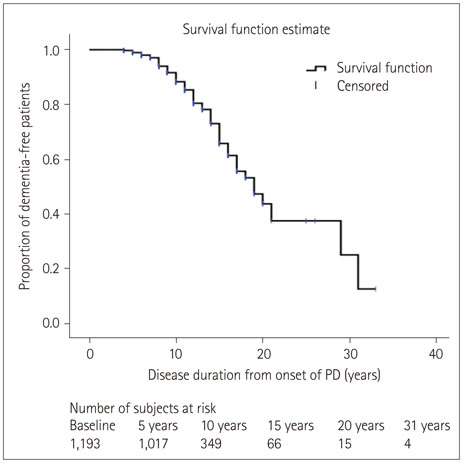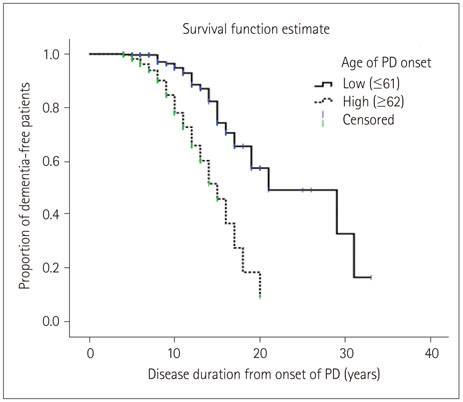J Clin Neurol.
2017 Jan;13(1):21-26. 10.3988/jcn.2017.13.1.21.
Dementia-Free Survival and Risk Factors for Dementia in a Hospital-Based Korean Parkinson's Disease Cohort
- Affiliations
-
- 1Department of Neurology, Parkinson's Disease Center, College of Medicine, Dong-A University, Busan, Korea. jwkim@dau.ac.kr
- 2Department of Preventive Medicine, College of Medicine, Dong-A University, Busan, Korea.
- 3Department of Statistics, Pukyong National University, Busan, Korea.
- KMID: 2364893
- DOI: http://doi.org/10.3988/jcn.2017.13.1.21
Abstract
- BACKGROUND AND PURPOSE
Few studies of dementia in Parkinson's disease (PD) have had long-term follow-ups. Moreover, information on the duration from the onset to the development of dementia in patients with PD is lacking. The aim of this study was to determine the median dementia-free survival time from the onset of PD to the development of dementia.
METHODS
In total, 1,193 Korean patients with PD were recruited and assessed at regular intervals of 3-6 months. We interviewed the patients and other informants to identify impairments in the activities of daily living. The Hoehn and Yahr stage and scores on the Unified Parkinson's Disease Rating Scale and Mini Mental State Examination were evaluated annually. We used Kaplan-Meier survival analysis to estimate the cumulative proportion of dementia-free patients over time. Risk factors predicting dementia were also evaluated using Cox proportional-hazards regression models.
RESULTS
The median dementia-free survival time in the Korean PD population was 19.9 years. Among the 119 patients who subsequently developed dementia, the mean duration from the onset of PD to the development of dementia was 10.6 years. A multivariate analysis identified age at onset and education period as the significant predictors of dementia.
CONCLUSIONS
This is the first report on dementia-free survival in patients with PD based on longitudinal data analysis from the disease onset. The median dementia-free survival time in Korean PD patients was found to be longer than expected.
MeSH Terms
Figure
Reference
-
1. Emre M. Dementia associated with Parkinson's disease. Lancet Neurol. 2003; 2:229–237.
Article2. Aarsland D, Zaccai J, Brayne C. A systematic review of prevalence studies of dementia in Parkinson's disease. Mov Disord. 2005; 20:1255–1263.
Article3. de Lau LM, Schipper CM, Hofman A, Koudstaal PJ, Breteler MM. Prognosis of Parkinson disease: risk of dementia and mortality: the Rotterdam Study. Arch Neurol. 2005; 62:1265–1269.4. Hobson P, Meara J. The detection of dementia and cognitive impairment in a community population of elderly people with Parkinson's disease by use of the CAMCOG neuropsychological test. Age Ageing. 1999; 28:39–43.
Article5. Levy G, Tang MX, Louis ED, CÔté LJ, Alfaro B, Mejia H, et al. The association of incident dementia with mortality in PD. Neurology. 2002; 59:1708–1713.
Article6. Hely MA, Reid WG, Adena MA, Halliday GM, Morris JG. The Sydney multicenter study of Parkinson's disease: the inevitability of dementia at 20 years. Mov Disord. 2008; 23:837–844.
Article7. Aarsland D, Kvaløy JT, Andersen K, Larsen JP, Tang MX, Lolk A, et al. The effect of age of onset of PD on risk of dementia. J Neurol. 2007; 254:38–45.
Article8. Hughes AJ, Daniel SE, Blankson S, Lees AJ. A clinicopathologic study of 100 cases of Parkinson's disease. Arch Neurol. 1993; 50:140–148.
Article9. Hoehn MM, Yahr MD. Parkinsonism: onset, progression, and mortality. 1967. Neurology. 1998; 50:318 and 16 pages following.10. Fahn S, Elton R. Members of the UPDRS Development Committee. Unified Parkinson's disease rating scale. In : Fahn S, Marsden CD, Calne DB, Goldstein M, editors. Recent Developments in Parkinson's Disease. Vol 2. Florham Park, NJ: Macmillan Health Care Information;1987. p. 153–163. p. 293–304.11. Folstein MF, Folstein SE, McHugh PR. "Mini-mental state". A practical method for grading the cognitive state of patients for the clinician. J Psychiatr Res. 1975; 12:189–198.12. Yesavage JA, Brink TL, Rose TL, Lum O, Huang V, Adey M, et al. Development and validation of a geriatric depression screening scale: a preliminary report. J Psychiatr Res. 1982-1983; 17:37–49.
Article13. Kang Y, Na D, Hahn S. Seoul Neuropsychological Screening Battery. Incheon: Human Brain Research & Consulting Co.;2003.14. Morris JC. The Clinical Dementia Rating (CDR): current version and scoring rules. Neurology. 1993; 43:2412–2414.15. Hely MA, Morris JG, Reid WG, Trafficante R. Sydney Multicenter Study of Parkinson's disease: non-L-dopa-responsive problems dominate at 15 years. Mov Disord. 2005; 20:190–199.
Article16. Hughes TA, Ross HF, Musa S, Bhattacherjee S, Nathan RN, Mindham RH, et al. A 10-year study of the incidence of and factors predicting dementia in Parkinson's disease. Neurology. 2000; 54:1596–1602.
Article17. Hobson P, Meara J. Risk and incidence of dementia in a cohort of older subjects with Parkinson's disease in the United Kingdom. Mov Disord. 2004; 19:1043–1049.
Article18. Aarsland D, Kurz MW. The epidemiology of dementia associated with Parkinson disease. J Neurol Sci. 2010; 289:18–22.
Article



